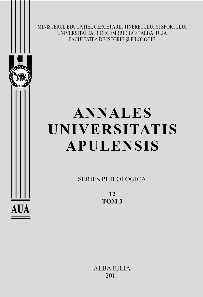Critica ionesciană ca autocomentariu
Eugen Ionescu’s Critique Regarded as Self-Commentary
Author(s): Adina CurtaSubject(s): Literary Texts
Published by: Universitatea »1 Decembrie 1918« Alba Iulia
Keywords: self-comment; polemics; freedom of spirit; secondary creation
Summary/Abstract: Known rather as a dramatic author than as a literary critic – even if his literary debut was in the form of literary criticism with the famous volume Nu - Eugen Ionescu approached within the critic genre a particular species, that of self-comment. Although he stated on numerous occasions that a play should not be presented but only acted, Eugen Ionescu felt the need to explain himself, especially as both the literary critics and the public had had surprising reactions to his play’s representations. The volume Note şi contranote, brings together fragments of critic self-comment realized in various contexts, in a tone reflecting sometimes polemics and sometimes only surprise and amusement. The playwright insists on the fact that both the public and the critics had never had any influence on him, but he cannot help himself to make them pay attention to the way he conceives the intimate process of creation and to the initial intentions he plans to put in his plays. Eugen Ionescu always strived to save his liberty as a writer and freedom of spirit, so that the approach of the critical self-comment genre may be interpreted along this line, of his preoccupation for the purity of the message and the respect for the liberty in case. Like his character, Bérenger, Eugen Ionescu will never surrender to any kind of conformity, or fashion, however strong and dominating. Ideologies only triggered his conservation instinct, making him want to defend himself from a possible contagion. Solutions to problems, in particular those raised by others, always seem mistaken therefore it is much better for the writer to limit himself to formulating problems, to identifying them, leaving his reader or spectator, as the case may be, to bring in his/her own solutions. When discussing his theatre and the reception of his plays by the critics and the public, Eugen Ionescu creates a sort of secondary creation, extremely coherent, well grounded on the arguments of authentic experience of self-expression, a work that beneficially doubles the primary one, while at the same time preserving its autonomy as a genre in itself - the genre of the self-comment.
Journal: Annales Universitatis Apulensis. Series Philologica
- Issue Year: 12/2011
- Issue No: 1
- Page Range: 95-106
- Page Count: 10
- Language: Romanian

